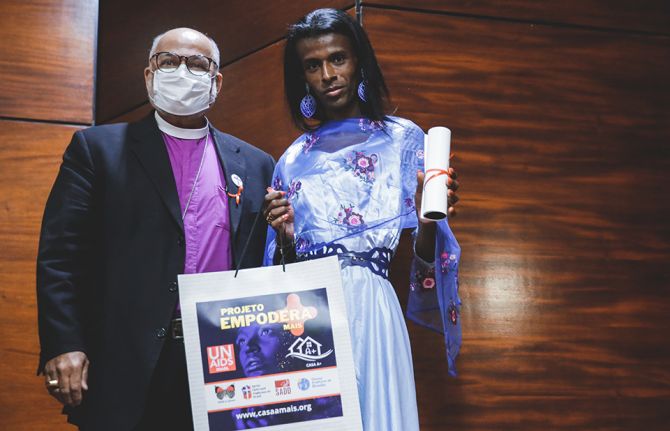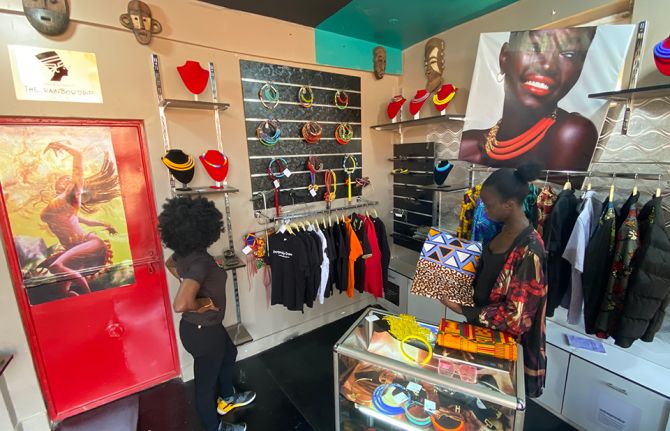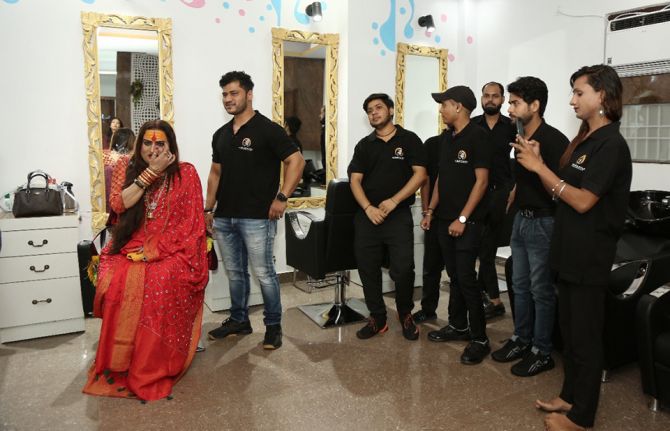



Feature Story
Social entrepreneurship—a tool of self-empowerment for the LGBTI community
20 April 2022
20 April 2022 20 April 2022The economic impact of the COVID-19 pandemic on lesbian, gay, bisexual, transgender and intersex (LGBTI) people has been huge. A 2020 survey of more than 20 000 LGBTI people from 138 countries showed that many had lost their jobs because of the pandemic. In addition, members of the community experienced increased discrimination, hate crimes and arrests. Criminalization combined with stigma and discrimination of LGBTI people in some countries has hindered their ability to seek essential economic and health-care support.
Several of the 23 UNAIDS Solidarity Fund grantees across Brazil, Ghana, India, Madagascar and Uganda are supporting LGBTI organizations in building economic capacities and driving social impact for their respective communities through diverse social entrepreneurship projects.
Uganda is home to more than 1.5 million refugees. Same-sex sexual relations are illegal in the country, and being a refugee brings a host of other challenges, including social exclusion. Adding to this, the COVID-19 pandemic has destroyed the livelihoods of many of Uganda’s refugees who are members of key populations. Through a Solidarity Fund grant, the Simma Africa Creative Arts Foundation set up the Rainbow Drip Craft Shop Project, which markets creative and cultural goods, including fine beaded and brass jewellery, handmade leather-craft shoes and Ankara fusion clothing made by LGBTI people and adolescent girls and young women from refugee camps and host communities. “The shop has become a safe space and a creative outlet for the community to channel their skills and talents towards building self-sustaining livelihoods,” said Natasha Simma from Simma Africa.
Also working with the Ugandan LGBTI and sex worker communities, Vijana Na Children’s Foundation (VINACEF Uganda) has set up a community-run salon offering diverse beauty treatment services. About 80 community members have been connected to social services and trained in social enterprise and financial management. “The social entrepreneurship project has enhanced community involvement and strengthened the capacity of LGBTI and sex worker communities while allowing them to gain and practice new skills to earn a sustainable income,” said Benard Ssembatya, the Executive Director of VINACEF Uganda. Inspired by this initiative, VINACEF Uganda is forming a network of salons to improve access to information on HIV, sexual and reproductive rights, tuberculosis, cancer and noncommunicable diseases for community members.
Similarly in Brazil, tapping into the talents of members from the LGBTI and sex worker communities in beauty treatment, Associação Social Anglicana de Solidariedade do Cerrado (Casa A+) implemented the Empodera Mais Project. “We motivated members from vulnerable backgrounds to participate in the social entrepreneurship project through the provision of the Empodera Mais Kit, with basic equipment and supplies for entering the hairdressing and beauty treatment profession,” said Anglican Bishop Maurício Andrade, the founder of Casa A+. The technical skills provided and encouraged members to start businesses in beauty treatment and survive the hardships of the COVID-19 pandemic. Technical partnerships with professionals, a beauty studio and institutions such as Palmas’ Municipal Department of Human Development provided the participants with on-site experience before launching their own businesses and generated a professional network to exchange experiences and get new business.
In Ghana, the Hope Alliance Foundation and the OHF Initiative launched the Community Economic Empowerment Program to set up social enterprises led by people living with HIV and LGBTI people to support them economically to confront complex political and COVID-19-related challenges. The initiative provided vocational skills training for the production of food and hygiene products to 30 young people, supported the creation of social enterprises in fashion design and supported the refurbishment and revamping of 10 selected small-scale businesses adversely impacted by COVID-19.
In India, Nachbaja.com’s online artist platform was set up to overcome the challenges of discrimination, unfair remuneration and the safety of artists from the LGBTI community. Meanwhile, Gaurav Trust opened its doors for members to be a part of a community-led salon, La Beauté and Style, and mobilized additional funding for sustainability and scalability.
Stories of growth continue with Let’s Walk Uganda, whose Jump Start project was established to host small-scale enterprises in fashion, design and the production of liquid soap led by gay men and other men who have sex with men. Community members have proven their ingenuity to grow, scale up and diversify their enterprises by successfully reinvesting the revenue from the first batch of products in new entrepreneurial ventures. This led to the development and launch of the UNAIDS-supported Stall App, an online social marketing app that could help to boost the sale of products developed by several key population-led enterprises, including other Solidarity Fund grantees.
“We must recognize that while the rest of the world recovers from the economic impact of the COVID-19 pandemic, its effects will last longer for marginalized communities. Hence, it is of the utmost importance to continue to support innovative community-led social enterprises designed to support livelihoods and overcome special challenges,” said Pradeep Kakkattil, the UNAIDS Director of Innovation.
Restoring the self-reliance and dignity of LGBTI communities must be grounded in initiatives led by themselves, with a focus on addressing inequalities. A common thread that connects these diverse enterprises is the ingenuity of LGBTI people in the face of hardship. The grantees demonstrated the potential of empowerment through art, creativity and professional skills supported by the Solidarity Fund seed funding. Acknowledging and embracing diversity in sexual orientation and gender identity in all areas is crucial to making the community visible, protecting them from stigma, discrimination and violence, and engaging them in the response to pandemics.



